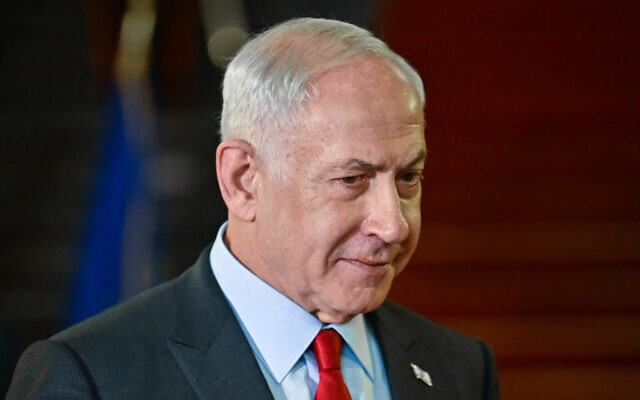As Saudis sidle up to Iran, some see US apathy, Israeli political chaos to blame
Riyadh has watched Washington grow more distant in recent years, and hopes for expanding Israel’s Gulf partnerships have been dashed by scenes of tumult in the streets

In July of last year, days before US President Joe Biden touched down in Israel before flying to Saudi Arabia, then-opposition leader Benjamin Netanyahu stepped up to the cameras in the Knesset to make the case for his return to power.
Among other things, his argument rested on the idea that only he could follow up on the 2020 Abraham Accords and expand Israel’s diplomatic footprint in the region.
“I intend to bring full peace agreements with Saudi Arabia and other Arab countries,” he declared.
On Friday, two months after Netanyahu set up shop again in his old office, Saudi Arabia made headlines around the world as it concluded a major agreement with a Middle Eastern power.
But the country Riyadh signed a pact with was not Israel. Instead, Saudi Arabia reached understandings with Israel’s archenemy, Iran — the very country Israel expects to form an Arab-Israeli coalition against.
Predictably, Netanyahu and Opposition Leader Yair Lapid — his predecessor — grabbed the opportunity to pin the blame on each other.
Lapid called it “a complete failure” for Israel. “This is what happens when you are focused on the judicial madness instead of doing the work against Iran and strengthening ties with US,” he said, referring to the government’s push to overhaul the courts.

Lapid’s partner in the previous government, Naftali Bennett, got in the act as well: “Countries in the world and region see Israel divided with a non-functional government, focused on serial self-destruction. And then those countries chose a side.”
On Friday, a senior official in Netanyahu’s entourage in Rome blamed the Saudi-Iranian rapprochement on “American and Israeli weakness” projected under the Biden administration and the Bennett-Lapid government.
Bipartisan betrayal
Perceived American weakness was almost certainly a factor in the move, but it didn’t emanate only from the Biden White House.
A leading Saudi journalist found the seeds of détente going back to Barack Obama’s administration, writing that “Washington and the West have not been serious about the region’s security since concluding the Iranian nuclear agreement in 2015.”

His successor Donald Trump, though well-received in the Gulf, further eroded Saudi trust. He chose not to strike Iran in response to the September 2019 drone and missile attack on a key Saudi oil processing facility. Once Riyadh understood there would be no American retaliation, it reached out to Iran, understanding it had to avoid a conflict it would not fight on its own.
But Trump also developed a close personal relationship with Gulf leaders, including Crown Prince Mohammed bin Salman, the kingdom’s de facto ruler.
Biden is a different story entirely.
“We [are] going to in fact make them pay the price, and make them in fact the pariah that they are,” Biden said while campaigning for president. “There’s very little social redeeming value… in the present government in Saudi Arabia.”

Shortly after taking office in January 2021, the 46th US president took some steps toward fulfilling his promise. He released to the public an intelligence report that pointed the finger at Saudi Crown Prince Mohammed Bin Salman (also known as MBS) for directly authorizing the killing of Saudi journalist and Washington Post columnist Jamal Khashoggi. Biden also scaled back US support for the Saudi-led air campaign in Yemen amid revulsion over civilian casualties, and took the Iran-backed Houthis off the US terror list.
“You didn’t have to be a diplomat or intelligence official to notice the deterioration in Saudi-US ties,” said Meir Ben-Shabbat, who served as national security adviser under Netanyahu and Bennett.
While he stopped well short of turning Saudi Arabia into a pariah, even meeting MBS in Jeddah following the Israel jaunt and seemingly shelving a planned review of the US-Saudi relationship, intense friction between the countries remained, helping push Riyadh and Tehran closer together.
“There’s little doubt in my mind that this failure is directly traceable to the Biden administration’s misguided strategy toward the region,” said John Hannah, Senior Fellow at the Jewish Institute for National Security of America and former national security advisor to US Vice President Dick Cheney.
“If Washington hadn’t spent the better part of two years implementing policies that by and large had the predictable effect of shattering MBS’s confidence and trust in America’s reliability as his foremost strategic partner,” he continued, “I’m doubtful that last week’s events in Beijing would have played out quite the way they did.”

Moran Zaga, an expert on the Gulf region at Mitvim – The Israeli Institute for Regional Foreign Policies concurred, saying it was clear from the beginning of the Biden administration “that there is a personal, ethical and also diplomatic disconnect with the Saudis.”
“The Americans effectively pushed the Saudis to do this,” she added. “What options did they have left?”
They might have had little choice but to talk to Tehran, but the decision to bring in China as a mediator was seen by some as a swipe at the US. Iran and Saudi Arabia have been meeting for years in Iraq and Jordan, and had no pressing reason to fly to Beijing to talk.
While many experts see China’s inclusion as an alarming indication of America being replaced in the region, the Saudis are unlikely to close the door on the US yet.

That is because Riyadh may still rely on the US-wide military presence in the region, which with dozens of bases and thousands of personnel is still far beyond what the Chinese have in the Gulf. By turning to China for talks, the Saudis may be trying to remind the Americans of their historic security alliance with the kingdom while signaling unhappiness with recent developments.
“It’s a finger in the eyes of the Americans,” an Israeli official told The Times of Israel.
Reality check
The other side of the accusations flying around from both sides of the political spectrum — that the Saudi-Iran détente is a result of Israeli policy — is a more complex question.
“It’s not an Israeli failure,” argued Alex Grinberg, an Iran expert at the Jerusalem Institute for Security and Strategy think tank. “It has nothing to do with Israel.”
Ben-Shabbat, who now heads the Institute for Zionist Strategies, wouldn’t say whether either of his former bosses were to blame. “Instead of giving out grades, I’d say that this is a development that heightens the challenges the US and its allies face in the Middle East.”
However, other experts saw a direct connection to the policies of the current government.

“With all the chaos in Israel right now, they have abandoned any expectation that Netanyahu might launch an attack on Iran’s nuclear program,” said an Israeli expert who asked to remain anonymous. “At least with Lapid, they thought he might have something to prove.”
Even if the détente isn’t a reaction to any particular Israeli policy, it should cause some serious rethinking in Jerusalem.
“It’s a reality check,” offered a European diplomat. “The Israelis are surprised only because the Israelis aren’t paying attention.”
The deal is a reminder that Israel is fairly limited in what it can offer. On its own, Israel can provide intelligence and advanced weapons, but only Iran can give the Saudis the regional stability they desire with the US disengaged.
And while Israel is giving those prizes quietly to MBS, there is no reason for him to open himself up to domestic backlash by signing an open agreement with Israel.

The current climate in Israel isn’t making expansion of ties especially attractive to Gulf states. Violence between Israelis and Palestinians is rising, and Netanyahu’s far-right partners seem to have a fairly long leash.
The bitter battles over the judicial reform also turn off the Gulf rulers, who prefer predictability and stability above all.
“When Saudi Arabia and the UAE look at Israel now, they say nothing very good is going to come out of this in the near future,” said Joshua Krasna, director of Center for Emerging Energy Politics in the Middle East.
“If the Israelis are being eaten up by themselves, then I think that plays into the Saudi perception that we don’t have to like the Iranians, but we have to make sure we’re not high up on their list.”

Increasing Emirati reticence toward Israel should also be a wake-up call. Support for the Abraham Accords is declining in Abu Dhabi, Netanyahu’s invite there is suspended, the Negev Summit is on hold and the UAE is reportedly freezing weapons purchases “until Netanyahu controls his government.”
Krasna said that recent conversations with Emirati experts revealed a fundamental misreading of the emirates’ motivation on the part of Israel.
“They said the Israelis never understood us,” he recounted. “They told me, ‘Israel thought the reason we went in is because we didn’t care about the Palestinians. We thought we could help the Palestinians more by engaging than by not engaging.'”
The Palestinian issue is even more important to the Saudi leadership. Senior officials have said repeatedly in recent months that there will be no normalization with Israel without a deal for a Palestinian state, in addition to their demands from the US.
Meanwhile, as the political fight escalates in the Knesset and on Israel’s streets, Netanyahu can forget about expanding the Abraham Accords.
“At this moment we are farther from normalization with the Saudis than we were a few months ago,” Krasna lamented. “I don’t think the Saudis would be interested in giving the current government in Israel that kind of prize.”
Do you rely on The Times of Israel for accurate and insightful news on Israel and the Jewish world? If so, please join The Times of Israel Community. For as little as $6/month, you will:
- Support our independent journalism;
- Enjoy an ad-free experience on the ToI site, apps and emails; and
- Gain access to exclusive content shared only with the ToI Community, including weekly letters from founding editor David Horovitz.

We’re really pleased that you’ve read X Times of Israel articles in the past month.
That’s why we started the Times of Israel ten years ago - to provide discerning readers like you with must-read coverage of Israel and the Jewish world.
So now we have a request. Unlike other news outlets, we haven’t put up a paywall. But as the journalism we do is costly, we invite readers for whom The Times of Israel has become important to help support our work by joining The Times of Israel Community.
For as little as $6 a month you can help support our quality journalism while enjoying The Times of Israel AD-FREE, as well as accessing exclusive content available only to Times of Israel Community members.
Thank you,
David Horovitz, Founding Editor of The Times of Israel









